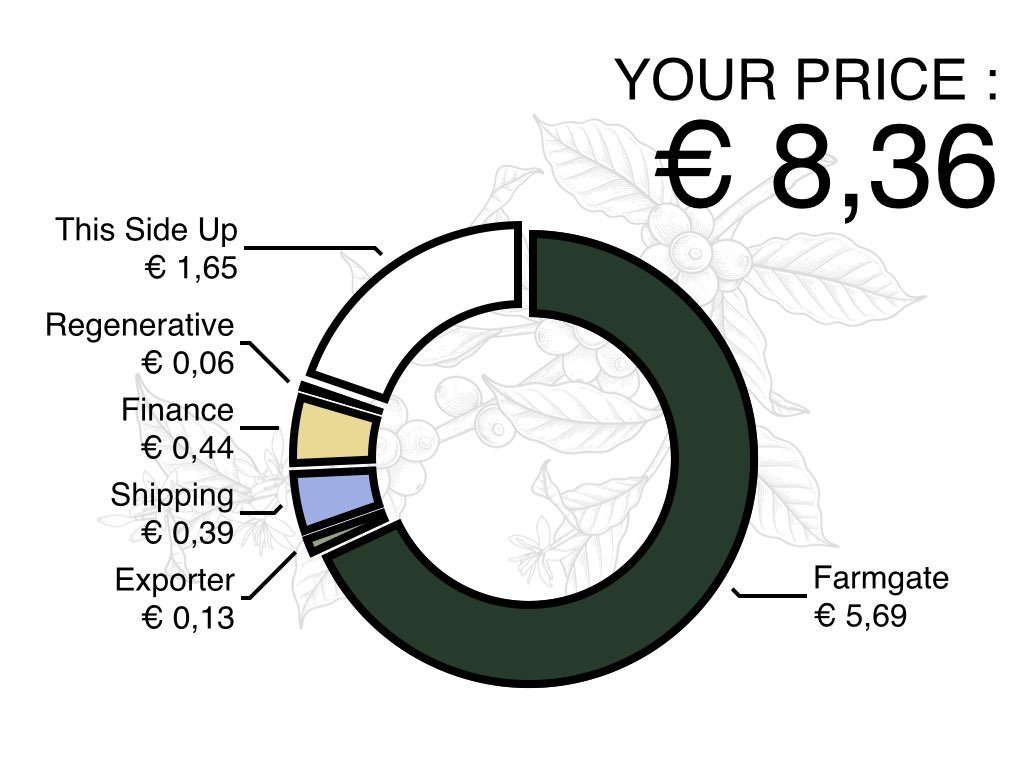WHERE FRONTIERS ARE REINVENTED
When we met Ellen, we were instantly drawn by her passion and humble commitment to coffee, its processes, and the environment. She is the fifth generation of coffee growers in her family, but most of what she now knows and applies to the field she learned by herself and through the technical assistance that Capricornio Coffees offer. When her grandfather passed, and she found herself in charge of the estate, she wondered, "how can I do this right?" and so the adventure began.
With her minimum interference approach, Ellen has been creating quite an impact in her region. Of the 100 hectares that conform her estate, only 23 are for coffee, which grows next to banana, avocado, and eucalyptus. Together with some neighbors and supporting organisations, she's preserving a forest of around 70.000 trees while looking after the river and creating alternative economic sources for the farmers, such as honey. She’s managed to reduce water use and works with natural combatants to pests, like stimulating wasps that eat the eggs of borers.
Ellen entered the specialty coffee market in 2013 and has since experienced steady growth that hasn't come without challenges, such as the frost of 2021. "It was truly exceptional," Ellen shares: "the wind brought the frost and it kind of burned the coffee plants, and especially in the valleys it stuck". About 10% of her trees died. "Climate adversities are something we simply need to live with. Every year, there's something new to face, a new challenge," she says. Because of these reasons, her commitment to preserving the environment is so substantial.
-
In an effort to regenerate and bring broken forests back together, Raízes do Mogi Guaçu (Conservation Roots) in alliance with Copaíba, and the WWF, and around ten coffee growers, neighbors of Ellen, the Atlantic Forest restoration project was born. As part of this program, Ellen recently planted around 1, 700 native trees. "The other day," she tells us, "as I was driving Isabel to school, I ran into a small jaguar. We had never seen one so close, and since this project started, more animals are showing up."
To learn more about Ellen’s efforts and what the Conservation Project is about, visit this link on Youtube.
CULTIVARS
Yellow Catuaí, Mundo Novo, Obatã, Yellow Bourbon.
Elevation
1.350 meters
NOTABLE
Fazenda Fronteiras’ total extension is 100 hectares; 21% is destined for coffee; 20% is forest and the rest is a wild area that Ellen hopes to populate with a biodiverse mix of trees.
A switch to organic fertiliser is on its way, much of the composting on the estate is done with the manure from their own cows, banana peels, avocado peels, and others.
PROCESSING
Natural : cherries are semi-automatically harvested in the estate and soon after dried. Coffee is then driven to the neighboring farm 7 Senhoras, where the hulling process is done. Then the parchment returns to Fazenda Fronteira where it is packed to be driven to Capricornio Coffees, where the color sorting and quality control process concludes.
Cupping Notes
2024 HARVEST
Key Achievements
-
2020: first connection between This Side Up and Ellen Fontana.
2021: first export to This Side Up.
2022: Ellen sells her coffee under her own brand and name for the first time to the European market.
2023: The This Side Up team visits and brings along a coffee bag with her name, bringing tears to her eyes. “It’s a dream come true”. Later in the year, Ellen comes second in the regional coffee quality competition of the Circuito das Aguas Paulistas (São Paulo).
-
The price you pay for Fazenda Fronteira natural p/kg. We agreed on this price directly with the farmers, disregarding the volatile US Coffee C price.
-
Capricornio buys unsorted green beans (all grades) from farmers and this is defined as farm gate price and is paid to them per 60 kg bag.
-
Capricornio incurs cost to sort all grades of green coffee purchased from the farmer into different lots under the specialty grade spectrum like single farmer lots, blends, nano/micro lots and competition lots. Other costs borne by Capricornio include dry milling, grain pro, small holder training fee and exporter charges for sorting, shipping the coffees to the Netherlands.
-
International shipping from Santos, Brazil to Rotterdam, Netherlands. It is inclusive of customs, insurance and warehousing.
-
Average financing cost owed to (mostly social) lenders. This ensures immediate payment to the farmers when the coffee leaves the farm or port.
-
A standard TSU premium on all coffees designated exclusively to accelerate farmers’ own regenerative agriculture projects.Read about the work done by Capricornio on creating an integrated pest management system for all their coffee partners.
-
This Side Up compensation for spending time and resources importing this coffee. Our work includes year-round contact with producers, managing export, shipping, import, warehousing, grading, sampling, finding and keeping roasting partners for Capricornio. € 1,65 is This Side Up’s Model 1 markup. For a full overview of our modular margin construction, see the Trade Models page.
PHOTO GALLERY
You may use these images freely to promote Fazenda Fronteira among your customers.














